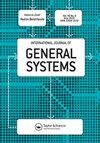完备格上(g, )-模糊粗糙逼近算子的重叠和分组函数的公理化刻画
IF 2.9
4区 计算机科学
Q2 COMPUTER SCIENCE, THEORY & METHODS
引用次数: 1
摘要
最近,蒋宏斌,胡伯强。(2022年。完备格上基于重叠和分组函数的(O,G)-模糊粗糙集。国际近似推理杂志(14):18-50。[Doi:10.1016/ j.j ijar.2022.01.012]在完全格上构造了一个具有逻辑连接-分组函数和重叠函数的模糊粗糙集模型,为模糊粗糙集理论提供了一种新的构造方法。在粗糙集理论中,公理化方法与构造方法同样重要。在本文中,我们继续研究-模糊粗糙集的公理刻画。传统上,逻辑连接词的结合性在现有模糊粗糙集模型的公理化研究中起着至关重要的作用。但是,分组函数和重叠函数缺乏结合性。因此,我们探索了一种新的无结合律的-上-下模糊粗糙逼近算子的公理化方法。此外,我们提供了单个公理来表征上下模糊粗糙逼近算子,而不是一组公理。最后,我们用单个公理刻画了由序列、自反、对称、-传递、-传递模糊关系及其组成的各种模糊关系所产生的模糊粗糙逼近算子。本文章由计算机程序翻译,如有差异,请以英文原文为准。
Axiomatic characterizations of (𝔾, 𝕆)-fuzzy rough approximation operators via overlap and grouping functions on a complete lattice
ABSTRACT Recently, Jiang, H. B., and B. Q. Hu. [2022. “On (O,G)-Fuzzy Rough Sets Based on Overlap and Grouping Functions Over Complete Lattices.” International Journal of Approximate Reasoning 144: 18–50. doi:10.1016/j.ijar.2022.01.012] constructed a -fuzzy rough set model with the logical connectives–a grouping function and an overlap function on a complete lattice, which provided a new constructive approach to fuzzy rough set theory. The axiomatic approach is as important as the constructive approach in rough set theory. In this paper, we continue to study axiomatic characterizations of -fuzzy rough set. Traditionally, the associativity of the logical connectives plays a vital role in the axiomatic research of existing fuzzy rough set models. However, a grouping function and an overlap function lack the associativity. So we explore a novel axiomatic approach to -upper and -lower fuzzy rough approximation operators without associativity. Further, we provide single axioms to characterize -upper and -lower fuzzy rough approximation operators instead of sets of axioms. Finally, we use single axioms to characterize fuzzy rough approximation operators generated by various kinds of fuzzy relations including serial, reflexive, symmetric, -transitive, -transitive fuzzy relations as well as their compositions.
求助全文
通过发布文献求助,成功后即可免费获取论文全文。
去求助
来源期刊

International Journal of General Systems
工程技术-计算机:理论方法
CiteScore
4.10
自引率
20.00%
发文量
38
审稿时长
6 months
期刊介绍:
International Journal of General Systems is a periodical devoted primarily to the publication of original research contributions to system science, basic as well as applied. However, relevant survey articles, invited book reviews, bibliographies, and letters to the editor are also published.
The principal aim of the journal is to promote original systems ideas (concepts, principles, methods, theoretical or experimental results, etc.) that are broadly applicable to various kinds of systems. The term “general system” in the name of the journal is intended to indicate this aim–the orientation to systems ideas that have a general applicability. Typical subject areas covered by the journal include: uncertainty and randomness; fuzziness and imprecision; information; complexity; inductive and deductive reasoning about systems; learning; systems analysis and design; and theoretical as well as experimental knowledge regarding various categories of systems. Submitted research must be well presented and must clearly state the contribution and novelty. Manuscripts dealing with particular kinds of systems which lack general applicability across a broad range of systems should be sent to journals specializing in the respective topics.
 求助内容:
求助内容: 应助结果提醒方式:
应助结果提醒方式:


